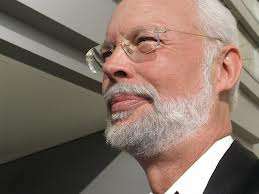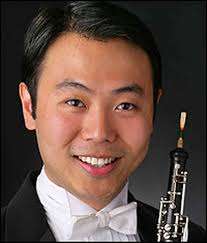|
Back
The Sounds of Surprise New York
Grace Rainey Rogers Auditorium, Metropolitan Museum of Art
04/05/2013 -
CONTACT! The New York Philharmonic's New Music Series
Unsuk Chin: Gougalon (U.S. premiere)
Poul Ruders: Oboe Concerto (US premiere)
Anders Hillborg: Vaporized Tivoli (New York premiere)
Yann Robin: Backdraft (U.S. premiere)
Lian Wang (Oboe), John Schaefer (Host)
New York Philharmonic, Alan Gilbert (Music Director/Conductor) 
P. Rouders (© Courtesy of the Artist)
Before Alan Gilbert, Pierre Boulez was the only New York Philharmonic Orchestra conductor who habitually, almost dutifully programmed music of his century. But Mr. Boulez did not proselytize his selections. He expected the massive New York audiences to consciously make the effort in understanding this foreign language.
That was obviously a miscalculation. Alan Gilbert, having been raised up in a New York Phil family (both generic and cultural) understands quite well that if one is to perform music of the 21st Century, efforts must be made, explanations or directions must be given.
The Phil’s CONTACT! is not ideal in this matter. The audiences at the Metropolitan Museum of Art are hardly your Avery Fisher Hall audiences. They are already attentive, alert, they are collegial, and are exuberantly appreciative. Thus, for these special listeners, Mr. Gilbert gives special bonuses. The music is new (mostly New York premieres) the composers largely unknown in America (though usually successful in Europe or Asia), but the program notes are detailed, and the composers are mostly in attendance. They don’t answer questions from the audience, but John Schaefer, amongst the most distinguished radio interlocutors, brings the composers up for five-minute discussions.
Not technical discussions, but personal, humorous, perhaps with the intent of making these so brilliant composers into human beings. Last night was an example. One had to read the notes carefully to understand the music, but it was a revelation to hear Swedish composer Anders Hillborg talk about his inspiration for Vaporized Trails after reading Ray Bradbury’s Something Wicked This Way Comes. And that Poul Ruders’ Oboe Concerto was based on lines from Joyce Carol Oates’ Firefox.
Did Mr. Ruders’ comment make a difference? Perhaps not. What did make the difference was that each movement of the Oboe Concerto was based on an area of the moon. And the moon being a dead–a very dead object–Mr. Ruders eschewed his usual exuberant, extrovert style to produce four movements which were almost static, nuanced, with strange aurae.

L. Wang (© New York Philharmonic Orchestra)
The Phil’s own First Chair oboist, Liang Wang, gave what seemed to be an authoritative performance, but this meant less virtuosity and far more atmosphere. These were long plaintive notes, with whispers from the chamber group of the Phil His notes, sometimes moving slightly, more often with long durations, with nuanced changes of timbre, were, at times, haunting, at other times puzzling.
I would have thought that Mr. Hillborg’s fireworks piece would have been more influenced by Bradbury’s Illustrated Man, which does take place in a carnival. Never mind. This story of playground/park/festival garden–the kind of area which Debussy and Charles Ives had already documented–was a surprise all the way, from fireworks shooting from the orchestra to pop tunes to a more somber moment to the ultimate surprise. When double bassist Fora Baltacigil turned to the audience for a somber solo, a scratchy, almost steel-sounding “amen” to the otherwise sparkling proceedings.
The French composer Yann Robin was schooled in jazz, but his Backdraft (New York Philharmonic co-commission with the Fundaçao Casa da Música, Portugal) was another tour de force, this time with incredible piano playing by Eric Huebner. (Mr. Schaefer remarked that a few minutes more of his playing and his fingers would turn into stumps.) It was also a baffling but inventive set of orchestral whispers and bangs and strange sounds all the way down to the tuba. It was great fun.
My favorite was a personal choice. Having traipsed countless times down the alleys of old Chinese, Korean and Japanese cities in my youth, the picture of these sounds by Korean composer Unusuk Chin brought back fond memories.
Not, though, the actual sounds.
I believe it was Béla Bartók who said that Hungarian sounds are heard most authentically when no actual Hungarian music is used. Unsuk Chin didn’t have to quote from folk songs or street sounds (her “Episode of Bottles and Cans” was the only purely literal noises, and the two percussionists did indeed play... bottles and cans.) But instead, I felt, oh so positively, so authentically, the limping beggar (an ostinato of rhythmic burps in the strings) for “The Grinning Fortune Teller with the False Teeth”, and I felt the chaos of the streets in “Dance Around The Shacks”.
These were not Straussian picture-images, these were not quotes from the Asia of her youth. They were the feelings of another time and another place, set in the context of pure music. Hers too were the sounds of surprise, but these surprises opened parts of the mind which had been closed for oh so long.
D. H. Lawrence once wrote “And I weep like a child for the past.” Unsuk Chin didn’t weep. She remembered and translated that past into a glorious present.
Harry Rolnick
|